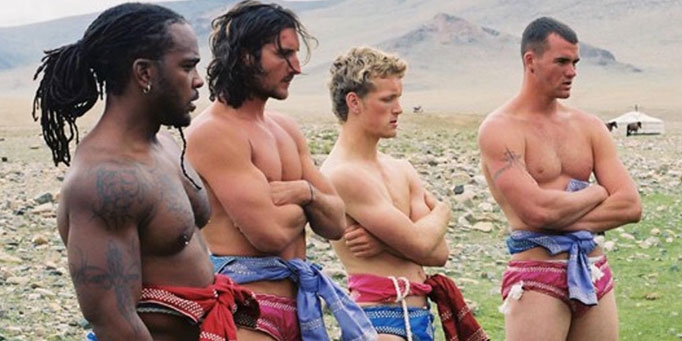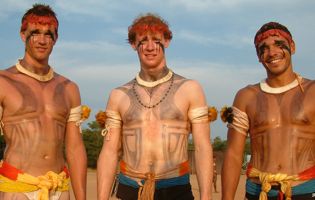
Last Man Standing: TV Review
What happens when 6 Western athletes compete against locals in remote tribes?
Reality TV
The fundamental promise behind reality television is that we’ll see people in their most honest moments. Big Brother reveals how we respond to exhaustion; Survivor shows what severe conditions do to our principles; even MasterChef suggests a kitchen knife and a stopwatch can show how much creativity we actually possess. But of course the crises contestants face are all fabrications that usually bear little resemblance to reality. However, Last Man Standing puts its players through situations real people face, in search of a real understanding.
Last Man Standing is a British reality series that first went to air in 2007 and is now receiving a new lease on life on Australia's ABC2. Vying for the title are six contestants – three Americans and three Britons – who’ve each risen to prominence in a range of sporting arenas. Bradley is from Oklahoma and famous for lifting huge weights, Mark is from Birmingham and a noted kick-boxer, Jason is a Floridian BMX racer… you get the idea. But rather than have them compete against each other over contrived courses constructed from ropes and pulleys, the producers take them to remote tribes around the world and let them tackle the local pastimes. In the first episode competitors take on Kalapalo wrestlers in Brazil, the next week they’re off to South Africa to learn Zulu stick fighting. But it’s not all battles. Week three is a traditional endurance race in the mountains of Mexico, and not long after, there’s a game of Trobriand cricket in the highlands of Papua New Guinea. The "last man standing" may only be competing against his fellow Westerners, but he soon finds out just how specialised his skills are.

A lesson in humility
This BBC production makes for good television for a number of reasons, not the least of which is an English sensibility for camerawork that’s hard to top. The series is a 12-week lesson in humility, and not just because of the exhaustion the competitors suffer. Each episode takes the team into a culture with which they have no familiarity, and that benefits from none of their specialised diets, equipment or training. The Mexican runners, for example, wear car tire sandles and kick a ball carved out of a lump of wood. What quickly emerges is a respect for cultures that have managed to produce marvelous athletes before the West arrived with its modern Olympics. In fact, six of the healthiest people on the planet find it hard to operate in their new terrain, let alone compete to the level locals are used to seeing.
Last Man Standing subtly reinforces the modesty that should naturally be part of the human condition. Regularly reading about sportsmen and women who have landed multi-million dollar contracts can suggest those individuals have risen to a level far above that of normal human beings. It’s the sort of thinking that, at its extremity, makes role models out of the morally bankrupt. This series celebrates what people can do if they put their minds to it while simultaneously showing the limitations of our strengths. The Apostle Paul had a similar lesson for his young protégé Timothy.
There were those around Timothy who were promoting popular physical regimens and religious practices they believed would gain them lasting, even eternal benefits. Some were just old wives’ tales; others amounted to dangerous heresies. Paul points out that as good as some training might be, it will always be limited by context. Physical gains cannot guarantee spiritual success:
For physical training is of some value, but godliness has value for all things, holding promise for both the present life and the life to come. This is a trustworthy saying that deserves full acceptance (1 Timothy 4:8,9).
Last Man Standing puts me in mind of the dedication verging on obsession some teens have with developing their physical prowess. A good parent could do well drawing their attention to just how far their strength can take them, and also what it will be unable to attain.
Watching Last Man Standing with your kids
Last Man Standing is something like Race Around The World and Survivor to watch, without all the annoying Americanisms. If your family has been interested in either, then they’ll probably sit through this. You should be aware though that very occasionally there is some coarse language. It usually arrives in the middle of someone running a marathon in bare feet over hot rocks, or just as he is hit by a particularly knobby club, so it’s not unexpected. It’s certainly not the focus of the series and older teens are unlikely to make much of it. Questions worth asking your kids include:
- Do you think the competitors would stand much chance against the locals?
- Is Last Man Standing about winning or discovering your limitations?
- What can’t a winning sporting career get you?
For more articles from Growing Faith, subscribe to our monthly e-newsletter.
To hear about the latest books and resources from Youthworks Media, subscribe here.







